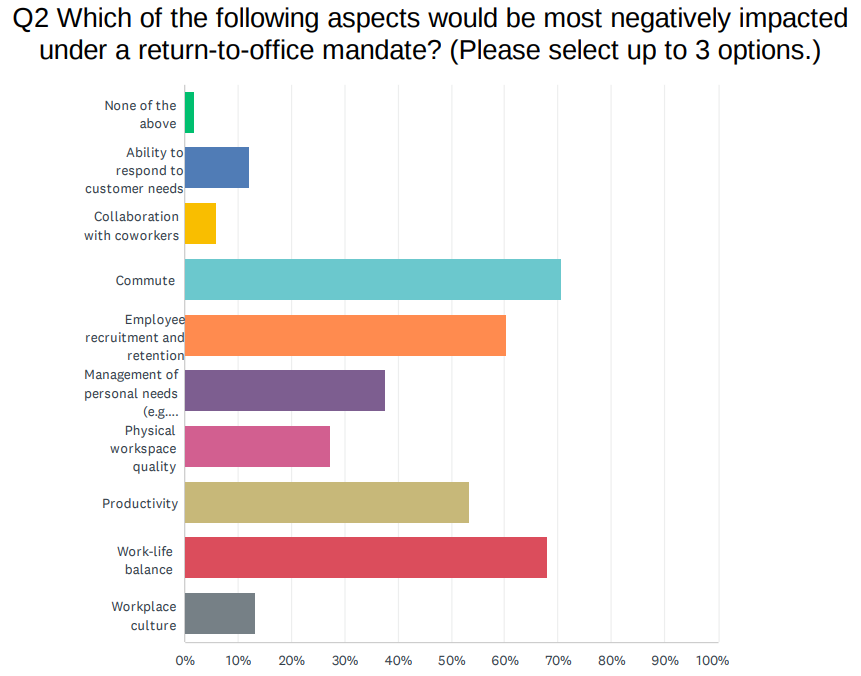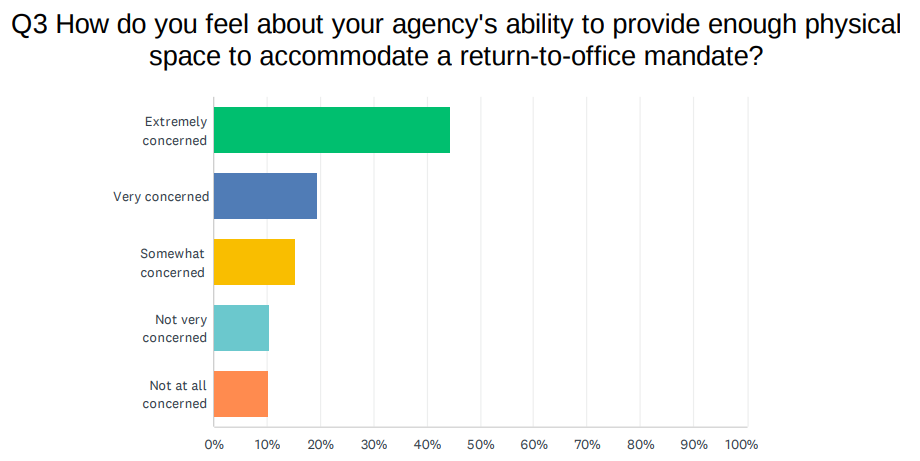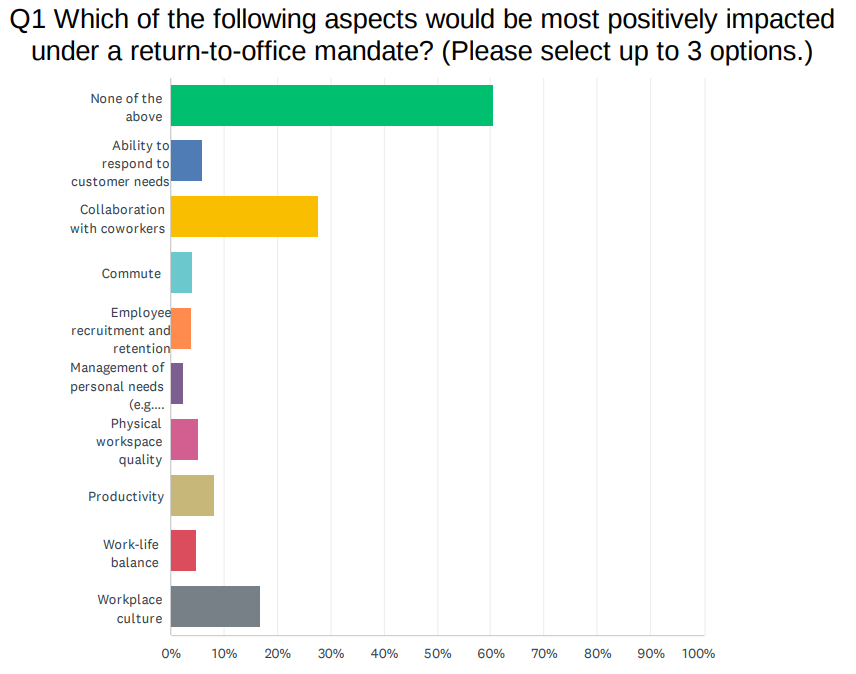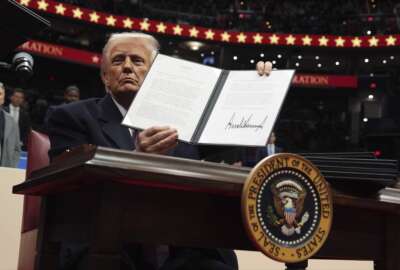Exclusive
Federal return-to-office directive will hurt productivity, survey respondents say
Federal News Network’s survey of over 4,600 feds shows many are concerned about a return-to-office mandate adversely impacting productivity, retention and more.
After President Donald Trump directed agencies to return the federal workforce to the office full-time, many federal employees said productivity will suffer under a blanket return-to-office mandate, according to the results of a Federal News Network survey.
Many survey respondents said the Trump administration should look more closely at the massive variations in jobs across government — and therefore the need for variations in telework policies too. Some respondents who filled out Federal News Network’s online survey of more than 4,600 federal employees expressed concerns about potential negative impacts of a “one-size-fits-all” return-to-office mandate.
“They need to look at individual agencies and individual jobs,” one survey respondent wrote. “Some jobs just do not need to be done in office — and some absolutely should.”
Currently, more than half of the federal workforce reports to work onsite due to the nature of their jobs. Employees who are eligible for telework are spending about 60% of their work hours, on average, in the office. Trump’s executive action Monday called on agencies to return their federal employees to fully in-office work “as soon as practicable.”
It’s unclear how or when Trump’s return-to-office directive to agencies will be implemented, but many feds in the survey felt negatively about the potential end results of the mandate as it’s written. When asked what factors would be most adversely impacted under a return-to-office order, close to 71% of Federal News Network survey respondents said the commute — making it the number one selection among survey takers. Work-life balance was the second-most selected option, with 68% saying it would worsen under a return-to-office mandate.

About 60% of respondents said employee recruitment and retention would worsen under a return to office. About 53% selected productivity, followed by the ability to manage personal needs, such as childcare or elder care.
“I’ve been caring for my 82-year-old dad,” one respondent wrote. “I was able to work two days from home, which was great. For zero reason, my employer changed this policy, and now I am forced to return five days a week. It’s been a real challenge.”
“Parents — especially mothers — often feel torn between a career and a family, even in the year 2025,” another respondent wrote. “Telework and remote work opportunities can ameliorate those fears by allowing folks to remain in their professional positions, while also being as present as possible for their growing children.”
In an open-ended survey question, some respondents said they believed there were political motivations behind Trump’s return-to-office executive action this week.
“This has nothing to do with productivity or results and is all political,” one respondent wrote. “Federal employees currently feel completely demoralized by this administration.”
“This is a baseless and punitive effort to target federal employees and reduce the size of federal agencies through resignations,” another respondent wrote.
Leaders of Trump’s Department of Government Efficiency, a nongovernmental advisory panel, have also said they would “welcome” terminations of federal employees that result from a return-to-office order.
A return-to-office and the federal footprint
More than a quarter of survey respondents said the quality of their physical workspace would be one of the aspects most negatively impacted under a return-to-office mandate.
“A crammed, noisy, small cubicle farm does not allow for concentration needed for high-quality and high-volume work, nor being able to appropriately communicate with customers,” one respondent wrote. “It makes it hard for employees to get along and to manage stress.”
“Our building is completely at capacity, and we are doubled up in cubes set up for one person,” another respondent added.
Due to telework options for eligible federal employees, some agencies have started scaling back on the amount of office space they own and lease, with plans in the works to continue shedding millions of square feet of office space in the coming years.
On a separate survey question, close to two-thirds of respondents said they would be either “extremely concerned” or “very concerned” about their agency having enough physical office space in the first place to accommodate a return-to-office mandate. About 21% said they were “not very” or “not at all” concerned about having enough space.

One survey respondent who works at the Department of Veterans Affairs, for instance, said their VA facility has “finite space.”
“If we were required to return to the office, there would not be sufficient space for staff to provide quality care to our veterans,” the respondent wrote. “For return-to-work mandates, there should be accommodations for facilities that don’t have sufficient office space. Work that can be done from home should be done from home, and work that requires in-person presence should be done in the office.”
Highlighting federal office space concerns, some respondents also said rather than pushing for a full return to the office of federal employees, the better solution would be to downsize the federal footprint to save on costs and improve efficiencies.
“If we are wasting millions on empty office space, the most logical solution is to get rid of the offices, not spend millions more filling them up with people who are more effective working remotely,” one respondent wrote.
The positive aspects of in-person work
When asked what aspects of work would be positively impacted with a federal workforce return to office mandate, close to 61% of survey respondents said, “none of the above.” The second top response, however, was “collaboration with coworkers,” with about 28% selecting that option from the list. The third most common selection among survey takers was “workplace culture” with 17% selecting the option.

Few federal employees — between just about 3% and 8% of respondents — said various aspects of work like productivity, the ability to respond to customer needs, work-life balance, and recruitment and retention would be positively impacted under a broad return-to-office mandate.
Still, some respondents pointed to positive aspects of a return to the office for the federal workforce.
“I focus better on work tasks when I’m at work,” one respondent wrote. “One area that benefits from in-person work is onboarding, training and mentorship of new personnel. It’s more difficult to form relationships and learn team culture over virtual means.”
“Routine telework destroys work culture, the ability to mentor employees and the speed of decision-making,” another respondent wrote.
“Employees are more productive and engaged when in-office,” still another respondent wrote.
Telework leads to better productivity, many feds say
Similar to the results of other surveys and data analyses, many survey respondents also said they were able to be more productive while working from home at least some of the time. Many said they believed a return-to-office mandate would lead to decreased productivity and efficiency in getting work completed.
“My team is more productive in a teleworking environment — the output proves it,” one respondent wrote. “There are fewer disruptions, and less time spent commuting often leads to more time on the clock. The level of engagement is high, and we actively use technology, like Microsoft Teams, for collaborative meetings and discussions. Telework also provides better work-life balance, so that staff are able to bring their most productive selves to work.”
Some respondents said having a long commute would worsen productivity and the number of hours worked. With teleworking opportunities, some said they put in more work hours that would otherwise be spent driving or on public transportation.
“My entire team lives in different states, but we are a well-oiled machine that efficiently and effectively get the job done with excellence,” one respondent wrote. “Forcing a return to work would be a major negative impact to both employees and stakeholders.”
At the same time, many respondents expressed concerns about people leaving their jobs, especially those who are high performers and more likely to find employment elsewhere. Some brought up the possibility of attrition of federal employees as a result of the return-to-office directive.
“It will result in talented employees leaving the government,” one respondent wrote. “The government should find a better way to retain high performers and talented employees to continue to serve the public in a meaningful way.”
Many times over, though, survey respondents said it’s crucial to consider the vast differences in the work federal employees do. Many said a “one-size-fits-all” approach to telework arrangements would worsen productivity. Some also pointed out that many — but not all — federal jobs should be performed onsite regardless. But ultimately, they said it depends on the agency and the specific job.
“Public-facing federal jobs and other select positions should be in person,” one respondent wrote. “However, a large number of jobs can be done outside of the office.”
“Yes, there are some jobs that have in-person customers, but many if not most of the teleworking community does not fit that description. Many teams do not sit together in the same spot,” another respondent wrote. “Congress needs to actually do some real research and ask personnel how it will directly affect each and every one of them.”
Copyright © 2025 Federal News Network. All rights reserved. This website is not intended for users located within the European Economic Area.
Drew Friedman is a workforce, pay and benefits reporter for Federal News Network.
Follow @dfriedmanWFED






